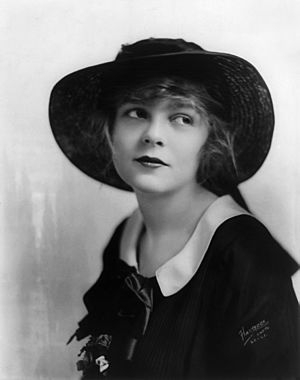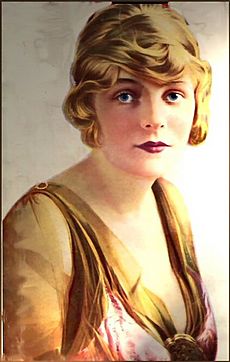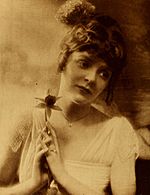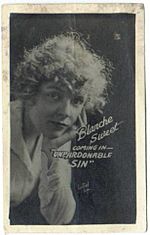Blanche Sweet facts for kids
Quick facts for kids
Blanche Sweet
|
|
|---|---|

c. 1915
|
|
| Born |
Sarah Blanche Sweet
June 18, 1896 Chicago, Illinois, U.S.
|
| Died | September 6, 1986 (aged 90) New York City, U.S.
|
| Occupation | Actress |
| Years active | 1909–1930, 1958–1960 |
| Spouse(s) |
|
Sarah Blanche Sweet (born June 18, 1896 – died September 6, 1986) was an American actress. She became famous during the early days of silent films in Hollywood. She was known for her strong and independent characters.
Early Life
Blanche Sweet was born Sarah Blanche Sweet in Chicago, Illinois, in 1896. Her mom, Pearl, was a dancer, and her dad, Gilbert, sold wine. Sadly, her mom passed away when Blanche was a baby. Her grandma, Cora Alexander, raised her, and Blanche was sometimes known as Blanche Alexander.
Her grandma helped her find many acting jobs as a young child. When she was just four, she toured in a play called The Battle of the Strong. She acted alongside famous people like Marie Burroughs and Maurice Barrymore.
Ten years later, she worked with Maurice's son, Lionel, in a film directed by D. W. Griffith. In 1909, she joined Biograph Studios and worked for director D. W. Griffith. By 1910, she was a friendly competitor to Mary Pickford, another young actress who had also started with Griffith.
Rise to Stardom
Blanche was known for playing strong, independent characters. This was different from the usual roles for women in movies back then, which were often more delicate. Her first big movie was the 1911 thriller The Lonedale Operator, directed by Griffith.
In 1913, she starred in Griffith's first feature-length film, Judith of Bethulia. The next year, Griffith first chose Blanche for a role in his famous movie The Birth of a Nation. However, the part eventually went to Lillian Gish. That same year, Blanche left Griffith and joined Paramount. This new studio offered her much higher pay.
The Biograph company did not reveal the names of its actors. So, a British film distributor called M. P. Sales introduced Blanche Sweet as Daphne Wayne.
Throughout the 1910s, Blanche continued to have many important roles in films. She remained a very popular leading lady. She often starred in movies directed by Cecil B. DeMille and Marshall Neilan. Film critics of the time thought she was one of the best actresses of the entire silent movie era.
She married director Marshall Neilan in 1922. Their marriage ended in 1929.
In the early 1920s, Blanche's career continued to do well. She starred in the first movie version of Anna Christie in 1923. This film was also the first time a play by Eugene O'Neill was made into a movie. In the following years, she starred in Tess of the d'Urbervilles and The Sporting Venus. Both were directed by Neilan. Blanche soon became one of the biggest stars at the new MGM studio.
Sound Film and Later Career
Blanche Sweet's career slowed down when talkies (movies with sound) became popular. She made only three talking pictures. One of them was her well-praised performance in 1930's Show Girl in Hollywood. She retired from acting that same year.
In 1935, she married stage actor Raymond Hackett. Their marriage lasted until Hackett passed away in 1958.
Blanche spent the rest of her career working in radio and in smaller roles on Broadway stages. Eventually, these jobs also ended. She then started working in a department store in Los Angeles. In the late 1960s, her acting work was recognized again. Film experts invited her to Europe to honor her contributions to film.
In 1975, she received the George Eastman Award. This award honors people who have made great contributions to the art of film.
In 1980, Blanche Sweet was one of many silent film stars interviewed for Kevin Brownlow's documentary. The film, called Hollywood, was about the silent film era.
A documentary about Blanche Sweet, called "Portrait of Blanche Sweet," was made in 1982 by Anthony Slide. In it, she talks about her life and career. On September 24, 1984, a special event honoring Blanche was held at the Museum of Modern Art in New York City. Blanche introduced her 1925 film The Sporting Venus at the event.
Death
Blanche Sweet passed away from a stroke in New York City on September 6, 1986. Her ashes were later spread in the Brooklyn Botanical Gardens.
Filmography
See also
 In Spanish: Blanche Sweet para niños
In Spanish: Blanche Sweet para niños




